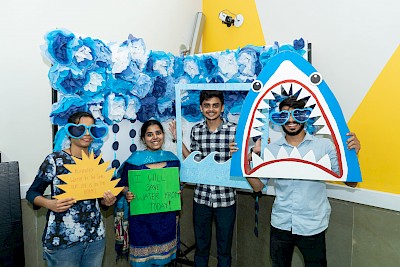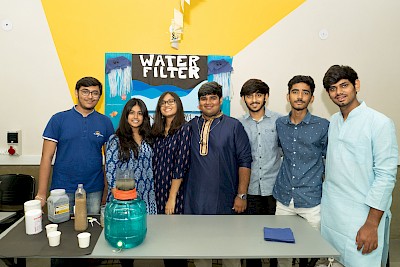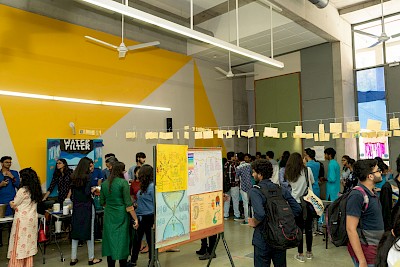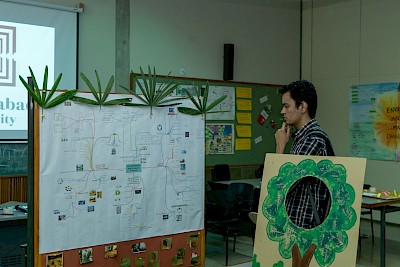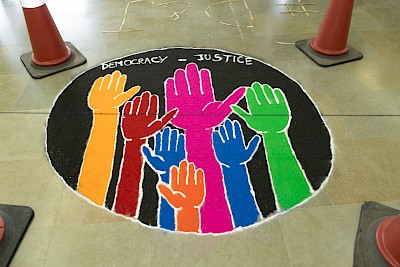At Ahmedabad University the goal of the undergraduate curriculum is first and foremost to make a student a thinking citizen of the country and the world, with the abilities and the inclination to make the world a better place, and then an engineer or a manager or a history major. This underlying philosophy then dictates how we design our undergraduate programme. It is different from that of more traditional undergraduate programmes and therefore this undergraduate programme can not be compared with other programmes that focus only on one discipline of study.
We aim to create a future engineer and manager and history major with an awareness of societal issues and the critical thinking skills to address them, along with domain knowledge. That is why all our students experience the Foundation Programme, and all will take many courses outside their discipline under the General Education Requirements. We believe India needs well informed and socially conscious citizens, and so does our planet.
We also firmly believe that if we only teach students courses in their discipline only and do not expose them to the interdisciplinary nature of issues and opportunities, their future career prospects will suffer – they may get their first job easily enough but as they rise in their organisation they will be denied opportunities for growth, i.e. promotion to positions of greater responsibility, if they do not have a larger vision. In fact, while the Foundation Programme is listed as four Studios on Democracy and Justice, Environment and Climate Change, Neighbourhoods and Water, for us these are vehicles to provide students a foundation in various topics in domains of Biology and Life, Materials, Constitution and Civilisation, Behaviour, Data Science and Communication.
The nature of traditional jobs and work places is also fast changing. The mechanical and computer engineer of today are together designing driverless cars that will also have to make decisions on whether to avoid hitting another car or a child who has strayed on to the road. Equations may not help there, one needs some notion of ethics and the ability to debate contentious issues that do not have simple solutions. Debates in the Democracy and Justice Studio, for example, will teach our students that, while satisfying one goal of the Communication Domain. A business manager who is overseeing a shift to a policy of working from home should be aware that for some employees leaving home allows them to escape more constraining environments. Students will learn about gender issues in the Studio on Water, as part of the goals of the Behaviour Domain. A large part of India lives in neighbourhoods that are varied in many respects. Visiting different parts of Ahmedabad, as students will do in the Neighbourhoods and Water Studios, gives them a perspective on issues citizens face in these localities and the Materials at their disposal and the possibility of a new product or service that can be launched for them. Those who recognise the dangers of environmental damage and climate change, as discussed in the Environment and Climate Change Studio and listed under the Constitution and Civilisation Domain, can also seize the opportunity to propose and propel the technological and policy solutions needed to limit the damage.
Thus while the Foundation Programme touches on Themes seemingly unrelated to the discipline of study of a student in reality the Studios provide the foundation in various Domains that will serve students well both in the coursework in their discipline and in their subsequent careers.For example, topics covered under the Constitution and Civilisation domain include Important elements of the Indian constitution and Nature of communities and its influence on the behaviour of individuals, and the Perception and reaction of different persons to the same information; topics under the Biology and Life domain include the Data collection, data organization, data visualization, and Data cleaning and filtering; and the activities linked to the Communications domain include
One of the purposes of a University education is to expose students to new experiences and to help them understand and appreciate these experiences.The Foundation Programme will require students to visit parts of Ahmedabad that they may not be familiar with and to engage with the people who live there.Some may be rich, some may be poor, some may be professionals, some may eke out their livelihoods on the footpath, they will all belong to the rich matrix of communities that live in Ahmedabad.
The Foundation Programme involves both lectures and activities.In addition, students will be introduced to academic articles about issues related to each Theme and Domain.These will provide the intellectual framework needed to appreciate these issues and will provide an introduction to students as to how academic articles are composed.
The Foundation Programme held first EXPO on campus during the academic year 2019-20 to exhibit the outcomes and outputs. The exhibits from all 4 Studios - Environment and Climate Change, Water, Democracy and Justice, Neighbourhoods in form of Working Models, Posters, Videos, Skits were created. The Expo was open for all students, faculty members, parents and friends.

